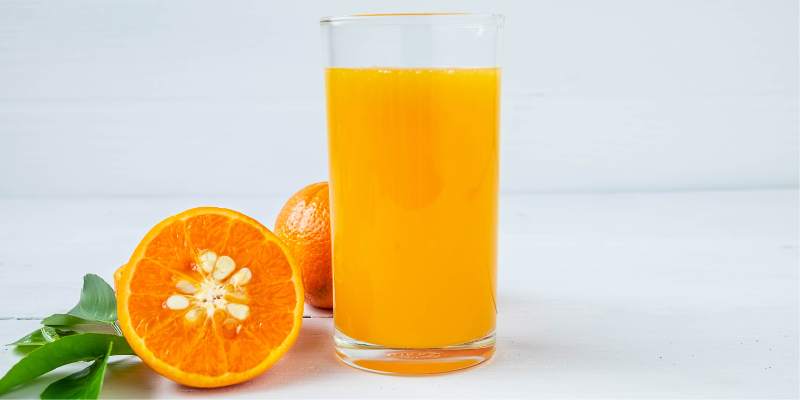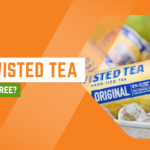As more individuals embrace gluten-free diets for various health reasons, gluten has become a hot issue in recent years. Knowing which foods include and which do not contain gluten is essential for persons who are gluten sensitive or intolerant. Is orange juice gluten-free – this fruit is frequently questioned about its gluten-free status. In this post, we will examine the subject in depth and offer a complete solution supported by reliable sources.
Does Orange Have Gluten?
Oranges do not contain gluten. Oranges do not have any cereals that contain gluten, which may be found in wheat, barley, and rye. As a result, those with celiac disease or gluten sensitivity can consume oranges without fear of becoming ill. Oranges are a healthy option since they are a fantastic source of vitamin C, fiber, and other necessary minerals.
Is There Gluten In Orange Juice?

Orange juice does not contain gluten. The protein known as gluten is only naturally found in grains like wheat, rye, and barley. It is not found in fruits or fruit liquids like orange juice. Oranges, free of gluten, are squeezed to extract the juice. It is crucial to remember that cross-contamination might happen if the processing or packing equipment comes into touch with gluten-containing materials. Because of this, people with celiac disease or gluten sensitivity should always check the labels of commercially available orange juices to be sure they are gluten-free. It is also advised to seek out specific guidance from healthcare experts.
What Drinks Can Gluten-Free People Have?
People who avoid gluten have several drink alternatives at their disposal. Water, coffee, tea, herbal tea, fruit juices (as long as they are not made from concentrate or have added gluten), vegetable juices, milk (including cow’s milk, almond milk, soy milk, and rice milk), and the majority of alcoholic beverages like wine and spirits (as long as they are not blended with gluten-containing ingredients) are all acceptable beverages for them to consume. Gluten-free people must carefully read labels and look for gluten-containing ingredients in packaged drinks. Additionally, gluten-free components can be used to make homemade shakes and smoothies.
What Drinks Can You Drink On A Gluten-Free Diet?
Drinks that can be consumed on a gluten-free diet include:
Water
Water is always a safe and healthy choice for individuals following a gluten-free diet. It is free from gluten and provides essential hydration to the body.
100% Fruit Juice
Most 100% fruit juices are naturally gluten-free, made solely from fruits without additives or added ingredients. However, it is essential to check the label to ensure no additional gluten ingredients have been added.
Milk
Milk, whether cow’s milk or plant-based alternatives like almond, soy, or coconut milk, is generally considered gluten-free. However, flavored or sweetened varieties may contain additives that could contain gluten, so it is advisable to check the label before consuming.
Coffee
Plain coffee without any added flavors or additives is typically gluten-free. However, certain flavored coffees may contain ingredients that could contain gluten. It is recommended to check the label or opt for plain coffee to ensure it is safe for a gluten-free diet.
Tea
Most teas are naturally gluten-free, made from leaves or herbs without added ingredients. However, some specialty teas or tea blends may contain additives that could contain gluten. Checking the label or opting for plain teas is advisable.
Soda
Many sodas are gluten-free, but it is essential to read the labels carefully as some may contain additives or flavorings that could contain gluten. Plain carbonated water or soda water is always a safe option.
Wine
Wine is generally considered gluten-free as it is made from fermented grapes. However, some individuals with gluten sensitivity may experience reactions to certain wines due to residual gluten from the production process. Choosing wines labeled as gluten-free or opting for wines made from grapes only is recommended.
What Soft Drinks Can Celiacs Drink?
Celiacs individuals with celiac disease need to be cautious about the beverages they consume, as some soft drinks may contain gluten or be cross-contaminated. However, several soft drink options are considered safe for celiacs. One popular choice is carbonated water or club soda, which is typically gluten-free and contains no added ingredients that may contain gluten. Another option is 100% fruit juice, as long as it is not mixed with any other ingredients that may contain gluten. Additionally, many brands of ginger ale and root beer are gluten-free. Still, it is essential to check the labels or contact the manufacturers to ensure they are safe for celiac consumption. It is always recommended for individuals with celiac disease to carefully read the ingredient labels and contact the manufacturers if necessary to confirm the gluten-free status of any soft drink.
What Common Drinks Have Gluten?
Since wheat, barley, and rye are all sources of the protein gluten, any beverages made with these components will also include gluten. Beer, malt beverages, and some varieties of whisky or bourbon derived from gluten-containing grains are among the popular drinks that may contain gluten. It’s significant to remember that not all alcoholic beverages include gluten because there are alternatives on the market that don’t. Additionally, if they are produced with protein components, some non-alcoholic beverages, such as flavors of flavored coffee, malted milkshakes, and particular fruit juices, may also include gluten.
Therefore, it is essential for people with celiac disease or gluten sensitivity to carefully read labels and get advice from manufacturers or specialists to ascertain whether a particular drink includes gluten.
What Juices Are Gluten-Free?
Juices can be naturally gluten-free if they don’t include any gluten or components that contain gluten. People who avoid gluten owing to celiac illness, gluten sensitivity, or personal choice can enjoy these drinks. Apple juice, orange juice, grapefruit juice, cranberry juice, pineapple juice, and lemonade are popular gluten-free beverages. While these juices typically contain no gluten, it is always advisable to verify the label or contact the producer to ensure there hasn’t been any cross-contamination during production. Furthermore, you should avoid any juice blends or blended fruit juices that could have additional components or additives, including gluten.
How To Tell If A Drink Is Gluten Free And How To Find Out For Sure?
Determining whether a drink is gluten-free can be challenging, as gluten can be present in various forms and may only sometimes be clearly labeled. However, there are several steps you can take to determine if a drink is gluten-free and find out for sure. It is important to note that the information provided here is for general guidance purposes only and should not replace professional medical advice or consultation with a healthcare provider.
Read the Label
The first step in determining if a drink is gluten-free is carefully reading the label. Look for any mention of gluten-containing ingredients such as wheat, barley, rye, or oats. Remember that oats are often cross-contaminated with gluten during processing unless they are labeled gluten-free. Additionally, some drinks may contain additives or flavorings that could contain gluten, so it’s essential to check for hidden sources.
Look for Gluten-Free Certification
Many manufacturers voluntarily obtain gluten-free certification from reputable organizations such as the Gluten-Free Certification Organization (GFCO) or the Celiac Support Association (CSA). These certifications indicate that the product has undergone rigorous testing and meets strict standards for gluten content. If a drink carries a gluten-free certification label, it provides more assurance that it is safe for individuals with gluten sensitivities or celiac disease.
Research the Manufacturer
If a drink does not have a gluten-free certification label, it can be helpful to research the manufacturer’s website or contact them directly to inquire about their manufacturing processes. Some manufacturers have dedicated facilities or production lines for gluten-free products, reducing the risk of cross-contamination. Additionally, some companies provide detailed information about their testing procedures and may disclose if their products are tested for gluten.
Consult Gluten-Free Lists and Apps
Several online resources, apps, and databases are available that provide lists of gluten-free drinks and other products. These resources compile information from manufacturers, user reviews, and independent testing to help individuals identify gluten-free options. However, it is essential to note that these lists may only sometimes be up to date, so it’s still crucial to verify the information with the manufacturer or through other reliable sources.
Seek Professional Advice
Suppose you have celiac disease or severe gluten sensitivity. In that case, consulting with a healthcare professional or a registered dietitian specializing in celiac conditions or gluten-related disorders is advisable. They can provide personalized guidance and recommendations based on your needs and dietary restrictions.
To find out for sure if a drink is gluten-free, it is recommended to contact the manufacturer directly. Manufacturers can provide the most accurate and up-to-date product information, including potential cross-contamination risks during production. They may also be able to provide additional details about their testing procedures or refer you to specific resources for further verification.
Gluten-Free Juice Brands List
Here is the gluten-free juice brands list:
- Suja Juice
- Evolution Fresh
- Naked Juice
- Pressed Juicery
- BluePrint Organic
- Lakewood Organic
- R.W. Knudsen Family
- Uncle Matt’s Organic
- GoodBelly
- Odwalla
What To Consider When Starting A Gluten-Free Diet?
Starting a gluten-free diet can be a significant lifestyle change for individuals diagnosed with celiac disease or non-celiac gluten sensitivity. It requires careful consideration and planning to ensure that the diet is nutritionally balanced and sustainable in the long term. Here are some essential factors to consider when starting a gluten-free diet:
Consultation with a healthcare professional
Before embarking on a gluten-free diet, it is crucial to consult with a healthcare professional, such as a registered dietitian or a doctor specializing in celiac disease. They can provide accurate information, guidance, and support throughout the process. They will also help determine if a gluten-free diet is necessary and rule out other underlying conditions.
Understanding gluten-containing foods
Gluten is a protein found in wheat, barley, rye, and their derivatives. To follow a gluten-free diet successfully, it is essential to understand which foods contain gluten and which do not clearly. Familiar sources of gluten include bread, pasta, cereals, baked goods, sauces, dressings, and processed foods. However, gluten can also be present in less obvious products like soups, gravies, and certain medications. Reading food labels carefully and being aware of cross-contamination risks is crucial.
Identifying safe alternatives
Eliminating gluten from the diet means finding suitable alternatives for staple foods that typically contain gluten. Fortunately, there are now numerous gluten-free options available in most grocery stores. These include naturally gluten-free grains like rice, quinoa, corn, millet, and buckwheat. Additionally, many gluten-free flours are made from alternative grains or legumes, such as almond flour, coconut flour, chickpea flour, and tapioca flour. Experimenting with different products to find ones that suit personal taste preferences is essential.
Nutritional adequacy
A well-planned gluten-free diet can be nutritionally balanced, but it requires attention to ensure that all essential nutrients are adequately obtained. Gluten-containing grains are a significant source of B vitamins, iron, and dietary fiber. Therefore, it is necessary to replace these nutrients with alternative sources. Whole grains like quinoa, brown rice, and amaranth can provide essential nutrients. Additionally, incorporating a variety of fruits, vegetables, lean proteins, dairy or non-dairy alternatives, and healthy fats is crucial for a well-rounded diet.
Cross-contamination risks
Cross-contamination occurs when gluten-free foods come into contact with gluten-containing foods or surfaces. This can happen during food preparation, cooking utensils, shared kitchen equipment, or even in restaurants. To minimize the risk of cross-contamination, it is essential to thoroughly clean all cooking surfaces and utensils before preparing gluten-free meals. Using separate toasters, cutting boards, and cooking pans can also help prevent cross-contamination. When dining out, you should communicate with the restaurant staff about your dietary needs and inquire about their gluten-free practices.
Why Is Gluten So Bad?
Gluten is considered bad for specific individuals due to its potential adverse effects on their health. Gluten is a protein found in wheat, barley, and rye, and it can cause various issues for people with gluten-related disorders such as celiac disease, non-celiac gluten sensitivity, and wheat allergy.
In individuals with celiac disease, consuming gluten triggers an immune response that damages the lining of the small intestine, leading to nutrient malabsorption and various symptoms like abdominal pain, diarrhea, and fatigue.
Non-celiac gluten sensitivity is a condition where individuals experience symptoms similar to those with celiac disease but without the immune system attacking the small intestine. Wheat allergy is an allergic reaction to proteins in wheat, including gluten.
For these individuals, avoiding gluten is crucial to managing their conditions and maintaining good health. However, it’s important to note that gluten is not inherently bad for everyone and poses no significant health risks for individuals without gluten-related disorders.
FAQs
Is Pineapple Gluten-Free?
Yes, pineapple is gluten-free as it does not contain gluten proteins. However, cross-contamination can occur during processing or packaging, so checking for any potential gluten-containing additives or processing methods is essential.
What Drinks Should Celiacs Avoid?
Celiacs should avoid drinks that contain gluten, such as beer, malt beverages, and certain types of whiskey.
Are Bananas Gluten-Free?
Yes, bananas are gluten-free. They do not contain gluten, making them a safe and suitable option for individuals with gluten intolerance or celiac disease.
Can Celiacs Drink Coke?
Individuals with celiac disease can generally drink Coke as it does not contain gluten. However, it is essential to note that cross-contamination may occur during the manufacturing process, so individuals with celiac disease should always check the label or contact the manufacturer to ensure the product is gluten-free.
What Are The Worst Foods For Gluten?
The worst foods for gluten are wheat, barley, and rye. These grains contain gluten proteins that can cause adverse reactions in individuals with gluten intolerance or celiac disease.
Is Coke A Gluten?
Coca-Cola does not contain gluten as it is made from carbonated water, high fructose corn syrup, caramel color, phosphoric acid, natural flavors, and caffeine.
Is Apple Juice Gluten Free?
Yes, apple juice is typically gluten-free as it is made from apples that do not contain gluten. However, it is essential to check the label or contact the manufacturer to ensure no gluten-containing additives or cross-contamination occurs during processing.
Is Tropicana Orange Juice Gluten Free?
Yes, Tropicana Orange Juice is gluten-free. It contains no gluten ingredients and is safe for individuals with gluten sensitivities or celiac disease.
Conclusion
In summary, while orange juice does not naturally contain gluten, there is a possibility of cross-contamination during production and potential additives that may contain gluten. Therefore, individuals with celiac disease or gluten sensitivity should exercise caution and choose orange juice labeled “gluten-free” or produced in dedicated gluten-free facilities. It is always recommended to read the ingredient list and consult with a healthcare professional if there are any concerns.






